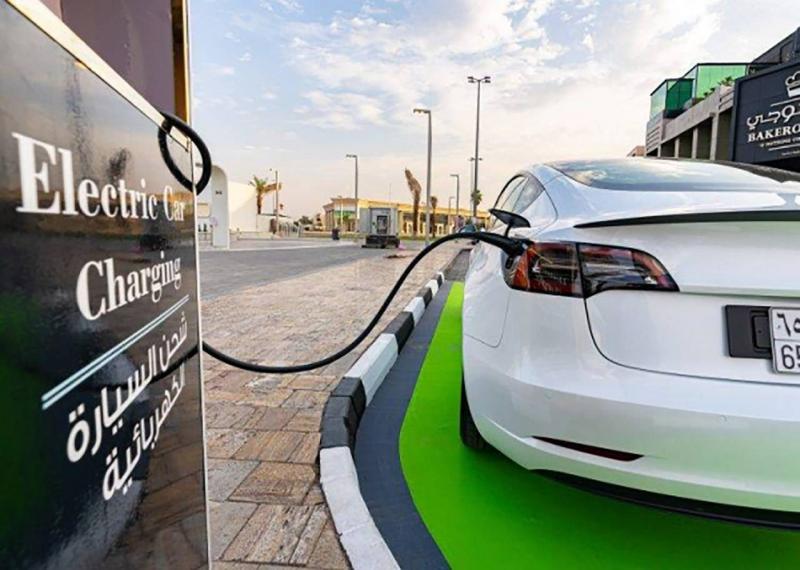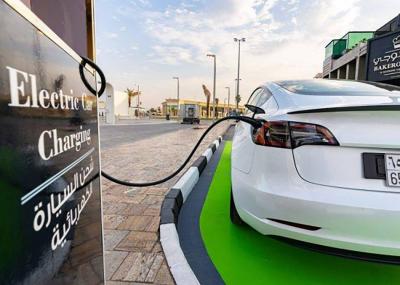Riyadh has spent billions in an effort to transform into a center for electric vehicle manufacturing, aiming to overcome obstacles such as a lack of infrastructure, skills, and raw materials while seeking to join the global race and reap the benefits of this emerging industry. Under a broader plan to reduce the Kingdom's economic dependency on oil revenues, Saudi Crown Prince Mohammed bin Salman has invested at least ten billion dollars in U.S.-based electric car manufacturer Lucid, launched its first electric vehicle brand "Seer," and established a factory for electric vehicle battery metals.
The Kingdom’s sovereign wealth fund, known as the Public Investment Fund (PIF), which has assets exceeding 700 billion dollars, targets the production of 150,000 electric vehicles annually by 2026, and then 500,000 vehicles annually by 2030. However, the only car factory in the Kingdom, which opened in September 2023, managed to reassemble components for only about 800 cars shipped from Arizona by December.
Saudi Arabia has struggled in the past to attract automakers to its territory. Japanese company Toyota refused to enter into a manufacturing agreement in the Kingdom in 2019 due to high labor costs, a lack of local suppliers, and a small domestic market. As the world moves away from traditional fuel-powered cars that have financed the Saudi economy for decades, analysts say that the same obstacles remain along with fierce competition.
Joraf Batra, an analyst in advanced global industries and mobility at Ernst & Young, stated, "Saudi Arabia will face immense competition from established manufacturing hubs and supply chains. There are many steps to be taken before the industry takes shape and takes off." Saudi officials did not respond to requests for comment from Reuters.
China currently dominates the emerging supply chain and electric vehicle production. Chinese company BYD has become the world's largest electric vehicle manufacturer, surpassing Tesla at the end of last year. However, it is likely that the U.S. Inflation Reduction Act, which aims to direct investment towards creating a low-carbon economy, will allocate tens of billions to the electric vehicle industry.
#### Local Supplier Industry First
One of the main challenges for the Kingdom is the inability to attract the automotive supply industry, from car doors to engines, due to the absence of a large domestic car manufacturing industry to support it. Local electric vehicle manufacturer Seer, a joint venture between the Public Investment Fund and Taiwanese company Foxconn, plans to launch a car by 2025, but it has not yet established its factory. A source close to the company, who spoke on condition of anonymity, said it is unlikely that the company will have a car on the roads before 2026.
Analysts have also expressed skepticism about achieving results in the near term. Tatiana Khristofova, an expert at S&P Global Mobility, stated, "We do not believe in Saudi Arabia's high production forecasts because high local production would require significant exports from the region. This is possible, but we do not see it on the horizon." In October, South Korean Hyundai Motor and the Public Investment Fund announced a joint venture to build a factory for combustion engine and electric vehicles. With Lucid and Seer, these three companies could form a car manufacturing cluster in King Abdullah Economic City in Jeddah. Khristofova indicated that this would not be sufficient to convince "automakers to localize production."
Seer is set to obtain components from German company BMW, including batteries, which are the most costly part of an electric vehicle. Faisal Sultan, Lucid’s global vice president, told Reuters last December that Saudi Arabia needs significant suppliers, adding that the company's factory in the Kingdom is only reassembling cars that have been previously assembled and sent for testing at the company's site in Arizona. A Saudi automotive manufacturing executive noted that the company's approach of keeping the supply chain and manufacturing within the U.S. might encourage other companies to establish assembly sites to take advantage of Saudi incentives aimed at supporting local industry. However, the executive also added that this approach could hinder local manufacturing expansion, as the country will continue to import cars manufactured abroad.
#### Lucid and Sustainability
At the United Nations Climate Change Conference (COP28) in Dubai last December, about 200 countries agreed on a formula to start reducing global fossil fuel consumption after the Organization of the Petroleum Exporting Countries (OPEC), led by Saudi Arabia, objected to another formula that solidified a commitment to phase out coal, oil, and gas. The Kingdom is keen to enhance its sustainability efforts and has highlighted Lucid cars at several government conferences.
The Saudi government has agreed to purchase up to 100,000 cars produced by Lucid over the next ten years, and in 2022, the Saudi Industrial Development Fund provided a good loan of 1.4 billion dollars to Lucid to help finance the construction of the factory. The Public Investment Fund owns 60% of Lucid and has invested at least 5.4 billion dollars in the company as of August 2023. Sultan stated, "I don't believe that the Public Investment Fund aims to make a huge profit from Lucid... this can be considered a strategic relationship. Developing the automotive ecosystem in the Kingdom is a significant success."
The Public Investment Fund did not respond to Reuters' request for comment. Saudi officials indicated last year that they hope to make the Kingdom a hub for manufacturing and supplying electric vehicle batteries. However, achieving this ambition requires raw materials, notably lithium, which Saudi Deputy Minister of Industry and Mineral Resources Khalid Al-Mudaifer told Reuters is one of the minerals the Kingdom seeks to produce, despite no public reserves announcement.
Robert Wilt, CEO of the Saudi Arabian Mining Company (Ma'aden), supported by the Public Investment Fund, stated that efforts to extract lithium from brine have entered the experimental phase. He said, "We have an emerging automotive industry in the Kingdom, which will need the raw materials required for electric vehicle battery production. We may not be able to achieve this in time alongside the construction of factories, so we will have to source them from abroad." In January of last year, the Public Investment Fund launched Monara Minerals for investment, a joint venture with Ma'aden, aimed at sourcing minerals from foreign markets.
Global industry executives say that regardless of the obstacles, Saudi Arabia has the financial resources to overcome them. Andy Palmer, former CEO of Aston Martin, remarked, "I cannot underestimate the capabilities of the Public Investment Fund because it has immense resources." Palmer also served as the chief operating officer at Nissan and oversaw the launch of the Nissan Leaf, one of the first mass-produced electric vehicles. He added, "Money can solve almost anything, but the money needed here is much greater than anyone thinks."




